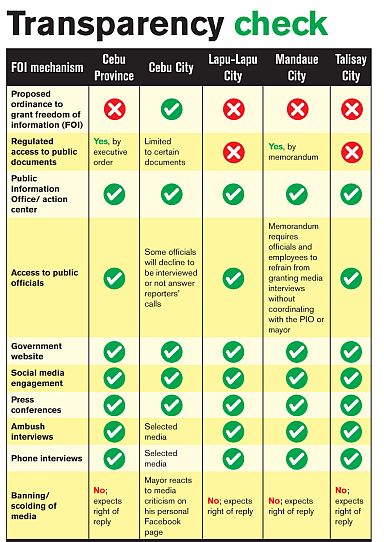
Graphics courtesy of CCPC
by Mayette Q. Tabada
(The Cebu Citizens-Press Council’s project to find out the transparency stance and mechanisms of the potential heads of selected local government units in Cebu started before the May 2016 elections. Questions formulated by University of the Philippines Cebu assistant professor Mayette Tabada and University of San Jose-Recoletos Department of Journalism and Communications chairman Nestor Ramirez, both CCPC members, were sent to mayoral and gubernatorial candidates. When some candidates did not reply before the elections, the project was revised after the elections to accommodate the answers only of the winning candidates.)
The Cebu provincial government and the cities of Cebu and Mandaue regulate access to information even after President Rodrigo Duterte signed last July 23 an Executive Order (EO) requiring all offices under the executive branch to grant full disclosure to the public. However, there is a proposal filed to grant the public access to information in Cebu City.
To survey local government practices in granting the public and the media access to information, the Cebu Citizens-Press Council started this initiative during the recent campaign period and continued after the newly elected officials assumed office last June 30.
The Freedom of Information (FOI) EO covers “all government offices under the executive branch including, but not limited to, the national government and all its offices, departments, bureaus, offices and instrumentalities including government-owned and –controlled corporations, state universities and colleges.”
This information refers to “any records, documents, papers, reports, letters, contracts, minutes and transcripts of official meetings, maps, books, photos, data, research materials, films, sound and video recording (magnetic or other tapes), electronic data, computer stored data or similar data or materials recorded stored or archived,” reported Rappler on July 24.
The FOI EO also “encouraged” local government units (LGUs) to “observe and be guided by this order.”
While the country has yet to enact an FOI Law, FOI laws—also known as “access to information” or “right to information”—are used in 95 countries around the world “to prevent or expose abuses, improve delivery of services and even protect people’s health and welfare,” reported Rappler on July 27.
Cebu Province
According to provincial public information officer Jason Monteclar, Capitol will continue to regulate the release of public documents, implemented through an executive order last year. Gov. Hilario Davide III may adopt new guidelines on access to public documents, such as transferring the control from the Capitol administrator to the PIO, he added.
The current practice in Capitol involves a daily briefing for beat reporters, personal and ambush interviews with Capitol officials, and the operation of a website and action center to handle complaints.
Cebu City
Councilor Jose Daluz III, on July 29, proposed an ordinance directing all offices under the city’s executive branch to “guarantee the people’s right to information.” If approved, the proposed FOI ordinance of Cebu City will provide information to the public as requested. Mayor Tomas R. Osmeña said he is “in favor of anything that promotes transparency.”
The Cebu City website is active. Press conferences are held almost daily or when the mayor has no appointments falling between 10 a.m. and noon.
Osmeña grants personal, ambush or phone interviews to some media outfits, such as ABS-CBN, The Freeman and some radio stations.
Media has access to certain public documents if copies are available at the mayor’s office. While the mayor permits media access to other Cebu City Hall officials, some department heads will decline or not answer calls from journalists.
Osmeña responds to media criticism by posting on Facebook (FB); his son, Miguel, manages his FB page.
Lapu-Lapu City
Mayor Paz C. Radaza sees that granting media access is crucial for her administration to reach out to the public.
Press conferences are conducted every Wednesday or when an issue arises. If the mayor is not available, the media or the public can approach department heads. Radaza is amenable to interviews through phone calls or texting. The administration works “from time to time” with social media writers.
Radaza says she will not openly censure or ban a reporter because that is detrimental to her administration. She expects media to grant her administration a chance to rectify any criticism or air their side in a controversy.
Mandaue City
Mayor Gabriel Luigi Quisumbing has prohibited department heads from giving statements to the media, according to Memorandum No. CMO-080816, which is signed by the executive secretary, lawyer Mae Elaine Bathan. All queries and press interviews will be centralized and handled by the Mandaue City Public Information Office.
At present, press briefings are held weekly or “as need be.” Quisumbing also grants personal, phone and ambush interviews. He allows access to public documents permitted by law.
“Reply or clarify is really the only acceptable recourse to critical or adverse reports,” he e-mailed.
Talisay City
Mayor Eduardo Gullas believes that people’s participation is “important” in his administration. To involve the sectors in decision-making, Gullas will activate a public information office, give the public and the media access to government documents and grant access to department heads and other city officials for city-related concerns. He will use the city’s website and social media to inform his constituents.
For the media, he will hold weekly press conferences and allow ambush and phone interviews. He says he will not ban, scold or report reporters or editors he finds undesirable.
Disclaimer: The comments uploaded on this site do not necessarily represent or reflect the views of management and owner of Cebudailynews. We reserve the right to exclude comments that we deem to be inconsistent with our editorial standards.
